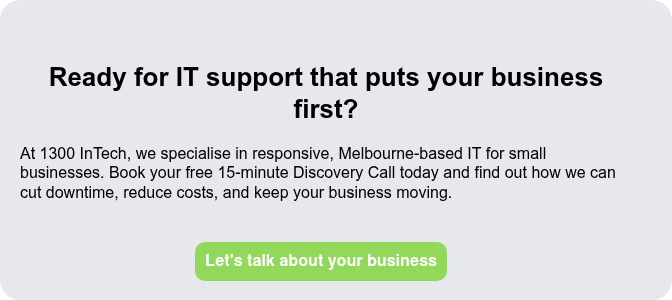Small businesses, due to limited budget and manpower, often rely on the business owner or a trusted employee to handle IT needs in the early stages.
While this may be manageable in the short term, at some point, the growth of the business will outgrow those capabilities. This becomes especially prevalent as more and more businesses conduct their operations online.
To stay efficient and competitive, you need an
IT service provider handling your technical demands. However, finding a reliable and credible partner can be a challenging task in itself.
Bigger isn't always 'better'
According to a 2022 research report,
8 out of 10 businesses were so frustrated with their IT service provider’s efforts that they considered actively replacing them. The problem is that most businesses are already locked into rigid 12-month contracts, leaving them stuck with poor service until the agreement ends.
And it’s tempting to assume that a larger provider is the safer option. After all, they often highlight their size, number of staff, and wide-ranging reach. But for many small-to-medium businesses, a smaller, experienced IT company can actually deliver greater value, better service, and a stronger partnership.
This is something we frequently hear from prospective clients at 1300 InTech. However, knowing that a smaller IT provider might be the smarter choice is only half the equation. The real key is asking the right questions before you commit.
That’s why we’ve outlined seven essential questions to ask when choosing a smaller IT provider. These will help you identify whether they can truly deliver the personal, reliable, and cost-effective support your business needs.
1. Tailored Services: Can you adapt to my business needs?
It’s common knowledge that because of their size and structure, big IT firms have large overhead costs. Which is why they’ll often push standardised packages that do not fit every business. This is why SMBs can end up paying for services they might never actually use.
Instead of adapting to client needs, many large providers follow rigid processes. Small business owners often feel overlooked and underserved by one-size-fits-all solutions. This is a common sentiment we hear from prospective clients and those who are now working with 1300 InTech.
However, when you pick a tight-knit IT provider, we know you by name, not by ticket number. This creates a more personal relationship where your business needs are truly understood. And instead of being passed around departments or left on hold, you deal with a consistent team. We learn your systems, adapt solutions, and align with your long-term goals.
2. Response Times: How quickly can you resolve issues?
Large providers usually take longer to resolve issues due to multiple layers of approval and internal processes.
This delay can be critical for small businesses that need faster response times. Every extra step adds wasted time while problems remain unresolved. As a business owner, it’s justifiable to think that every second of downtime is money thrown out the window.
Instead of waiting for someone to take action, smaller companies provide direct access to the technicians you need. Smaller-scale IT providers have fewer resources to work with, but problems are solved quickly and often before downtime seriously impacts your business. Our ability to respond fast helps you stay productive.
3. Expertise: Will an experienced consultant handle my account?
With large IT providers, small businesses often deal with junior staff who follow scripts rather than seasoned experts.
This is usually not a problem, but when they do escalate, SMBs may wait days before someone with true expertise looks at their case. This can lead to inefficient or incomplete fixes and frustration on your end.
Working with a smaller managed services provider increases your chances of having experienced engineers or consultants on your account. Thanks to our tight-knit nature, you’ll be coordinating with a senior IT consultant who brings practical knowledge built from years in the field. You receive advice and solutions from specialists who have solved challenges for businesses just like yours.
4. Local Advantage: How ‘local’ is your support team?
This is an important question to ask because companies, not just IT providers, often outsource some or all of their operations overseas. Not only because of cost savings from reducing overheads, but also to address labour shortages caused by local IT skill gaps.
However, this isn’t always a bad thing since you can get cost-effective talent that manages technical requirements reliably. This is why around
78% of Australian companies across industries are doing the same.
But for small-to-medium-sized businesses, this can lead to support delays. Large IT providers outsourcing their core operations overseas may only respond during their own business hours. The delay can cause longer downtime, further impacting productivity and profitability.
Working with a smaller, local managed service provider means you get convenience and faster service. You won’t need to wait extended hours for help, and issues are resolved quickly before they affect your operations.
In addition, you get support from professionals who understand local business culture, industry standards, and compliance requirements, ensuring your IT aligns with Australian regulations.
5. Cost-Effectiveness: Are your services priced for SMBs?
Large IT companies often charge higher fees to cover their overheads. Small businesses can struggle to justify these costs when they only need basic services. Many managed services providers also bundle unnecessary features into contracts.SMBs then end up locked into paying for technology they rarely, if ever, rely on. Large IT providers also pass on their overhead costs to clients, which makes your pricing less flexible.On the other hand, smaller companies can often provide tailored solutions that suit your budget. By focusing only on what you actually need, boutique firms help you avoid paying for unnecessary services. The result is a better value without sacrificing quality.
6. Reliability: Will you be a long-term partner?
This is the most important question — as a business, you want not only cost-effective IT support, but someone reliable to trust your systems and data for years to come. However, large IT providers often view small businesses as a lower priority compared to their enterprise clients. This usually means less attention, slower service, and limited long-term commitment.
For many small businesses, this creates uncertainty. Once the contract is signed, the relationship feels transactional, with providers focusing on KPIs instead of genuine partnerships and long-term success.
Without true investment, small businesses risk being treated as just another account number. Over time, this lack of personalised care can restrict growth and create frustration.
7. Onboarding: What does your process look like once we sign?

If you receive satisfactory answers to all six earlier questions, the next step is understanding the onboarding process once a contract is signed.
This stage is essential because it demonstrates how your managed service provider transitions from planning to becoming a reliable partner for your business. A structured onboarding also establishes the foundation for a long-term working relationship.
The process often begins with technical audits and focused meetings to fully evaluate your current infrastructure and business objectives. Discussions will highlight strengths, weaknesses, and opportunities that align your IT environment with operational goals. This groundwork allows both sides to set realistic expectations and measure deliverables.
Next, timelines, responsibilities, and milestones are outlined to support a smooth transition. A detailed onboarding plan helps reduce disruptions by addressing risks early while integrating seamlessly with your team. The ultimate goal is not only to deliver effective solutions but also to build trust and confidence from the very beginning.
Final Thoughts

Choosing the right IT provider isn’t just about ticking boxes. It’s about finding a partner who will save your business time, money, and stress while helping you grow.
By asking the right questions, you’ll quickly see whether a provider is invested in your success or simply selling you a contract. But don’t ignore the less tangible side of the process — how does the interaction feel as you go through your selection journey?
Trust your instincts. If communication feels rushed, impersonal, or overly transactional now, it’s unlikely to improve once you’ve signed an agreement. Gut feeling matters. The right IT provider should feel like an extension of your team, someone you can trust to have your back when it counts.
At 1300 InTech, we’ve built decades-long relationships with Melbourne businesses by combining personalised service, fast response, and long-term reliability. Ready to experience the difference?
Book your free 15-minute consultation today and see why so many small businesses across Melbourne trust us to manage their IT.
FAQs about Melbourne IT service providers
Are small IT companies as reliable as larger providers?
Yes — in fact, many small managed services providers have highly experienced IT consultants who’ve worked across a wide range of industries. They focus on building long-term client relationships, so reliability and proactive support are a top priority.
Do small IT service providers cost less than big ones?
Often they do. As discussed above, Large IT providers carry higher overheads, which can inflate service costs. Smaller companies like 1300 InTech are usually more flexible, offering tailored IT support packages that fit your budget without unnecessary extras.
Can a small IT company handle cybersecurity needs?
Smaller IT providers can do just as much as a large one, only at a more personal scale. For example, 1300 InTech offers managed IT support, cloud services, cybersecurity, and even acts as an independent IT consultant. Contact us today to learn more.










